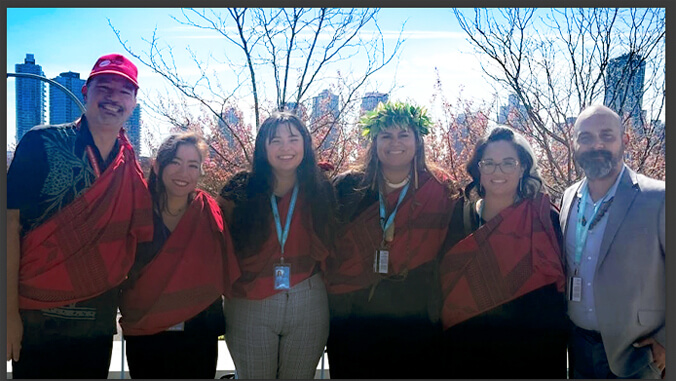
students and graduates are making waves in the world of 花秀直播an genealogical research. On April 23, they presented their work at the United Nations headquarters in New York City, unveiling a groundbreaking project that seeks to reconnect kānaka ʻōiwi (Native 花秀直播ans) with their ancestral roots.

Three haumāna (students); Haliʻa Osorio, Brandi Ahlo and Alyssa ʻĀnela Purcell, from the (HSHK) shared their findings from the , where they transcribe and digitize handwritten moʻokūʻauhau (genealogical) records penned mostly in ʻōlelo Hawaiʻi (花秀直播an language) during the 19th century. The project’s goal is to provide free public access to these records, allowing kānaka ʻōiwi to trace their genealogy with the click of a button.
“Our eyes go big and our hearts beat faster when we learn a story or find a lineage that our professor has never seen before,” said Purcell, the project’s lead researcher who is pursuing a PhD in Indigenous politics. “It makes me excited to realize that there is so much more to learn about our ancestors and—in that same vein—ourselves as a people.”

Royal connections
The Moʻopono Project, launched in 2021 by HSHK Professor Lilikalā Kameʻeleihiwa, set out to transcribe 55 books originally authored by the Board of Genealogy of 花秀直播an Chiefs and other sources. These books contain intricate family lineages from across ka pae ʻāina o Hawaiʻi (花秀直播an archipelago), including ancestral data from notable historical figures such as Queen Liliʻuokalani and historian S.M. Kamakau.
Paʻa i ka hana, very busy working
During their presentation at the United Nations Permanent Forum on Indigenous Issues, student researchers explained the fragile books had been stored for decades at the Hawaiʻi State Archives, largely out of reach of the general public. Working off of scanned images, the haumāna have transcribed 7,385 of the 9,000 pages so far, with more work on the horizon.
“Our ancestors were geniuses in how they embedded genealogies into our stories, music, chants, and everyday language,” Purcell explained. “Because of them, our knowledge is everywhere—we just need the appropriate systems and tools to access it.”
- Related UH News story: 花秀直播an studies students urge U.N. to investigate Red Hill leaks, Indigenous rights, May 3, 2022
The student researchers aim to complete the pioneering project as part of their mission to help kānaka ʻōiwi reclaim their ancestral identity and inspire Indigenous communities from around the world to revive and reclaim their own histories.
“Our ancestors wanted/want us to know them and to engage them. Our ancestors want to empower us. What a rare and potent form of aloha,” Purcell said.
